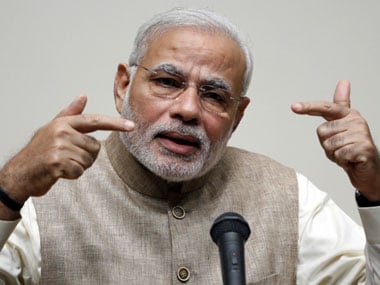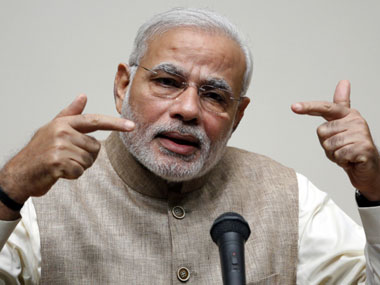The Prime Minister’s much-discussed interview with Times Now, among other things, made one point very clear. Narendra Modi’s relationship with India’s mainstream media remains at best testy, at worst hostile and in a state of permanent disrepair. To decongest issues, this is not to say that the media should act as a cheerleader for the politicians. The relationship should remain professional, even adversarial but fair. But as a former Gujarat chief minister and now at 7 Race Course Road, Modi, an elected representative, has faced and continues to face overarching, ruthless and relentless animosity from the media. Modi has responded to this treatment in the only way he knows. Both in Gujarat and now in New Delhi, he has made himself scarce before the mainstream medium of communication. In the rare instances where he has appeared before it, as he did during the interview which was aired on Monday evening, it emerged that this distrust is mutual and deep. [caption id=“attachment_2773016” align=“alignleft” width=“380”]
 Prime Minister Narendra Modi. Reuters[/caption] And it was evident even when the Prime Minister was in a jocular mood. On being asked by the interviewer why the sense of humour that pervaded his address to the joint session of US Congress is missing in his national discourse, Modi replied that it is out of fear of being hunted down by the media. “I have a humourous side, but these days humour can be a risky thing… In this era of 24x7 news channels, anybody can lift a word and make a big issue out of it. But I will tell you the truth, the reason for the absence of humour in public life is this fear. I am scared too. Earlier when I used to make speeches, I would make it so humourous, but now I am in fear. “And not just me, everyone is scared. My speeches used be humourous. I see it in Parliament, that humour is finished there too. It is a matter of concern. Even if you mention a proverb, they (media) will connect it with something else and begin a conversation. The one who is saying the proverb does not know for what he is speaking.” This scathing indictment was followed by another quip, more a straight jab, when the issue of his foreign travel came up. Modi has been repeatedly criticized for his tours abroad. Some of this is unwarranted. To put it in perspective, as US secretary of state, Hillary Clinton visited as many as 112 countries between the years 2008-2012. Modi toured 26 countries in 2015, logging far less air miles in comparison. As a head of state, many of his visits broke new grounds. He toured five Central Asian states, even Seychelles — the first by an Indian PM in 30 years — and believes that this is to help India stamp its presence in an increasingly inter-connected world. “We need to understand that earlier the world was bipolar. Foreign policy would be centered around two super powers. India was a little late in realizing that this bi polar situation was for namesake. Now the entire world, in changed circumstances, especially in 21st century, it is more interdependent and inter connected…” But his larger point brings out the distrust of the media more clearly. The Prime Minister felt compelled to visit so many countries and meet heads of states in person because otherwise, they would form an assessment of him through the prism of media and that is a risk he cannot afford to take. “The world didn’t know me. The world wants to know who the head of the state is. If someone wants to know Modi through the eyes of the media, then he would be confused about which Modi is the real one. “If that happens, the country will be at a loss. Modi’s personality shouldn’t be a hindrance for the world to have faith in India. But unless I meet all those leaders and engage with them, unless I speak to them frankly, they wouldn’t know about me, more so because I am not from a political family.” At another place he suggested that there is a difference between what media thinks of Modi and what the people of India think of him. When Arnab prefaced a question on the government’s failure to bring back black money with the words “public thinks”, a deadpan Modi cut it: “The public does not think so. The public knows that if there is one person who will bring the money back, it is Modi.” The subtext was clear: What the media says is not necessarily what the masses believe – and that he does not need the media to play the medium. Development was the promise Modi made while riding to power in 2014. The media has often highlighted incendiary comments from some far right elements or even BJP hotheads while seeking to justify its narrative that behind Modi’s development promise, lies a communal agenda. This has long been the greatest area of friction between Modi and the media. On whether comments from hotheads will derail his focus on development, Modi sought to put the onus on the media, asking it to not blow those up. “I would like to tell the media not to make heroes out of those people who make such comments. Don’t make them heroes, they will stop. I see such statements by people on TV, whose faces I haven’t even seen and they end up becoming spokesmen on TV. I don’t know why such people are encouraged…” At the end of a long one-on-one discussion, the interviewer sought to thank the PM for appearing for an interview. Modi was quick to respond. “I just request you to not create controversies out of this but instead use it for the benefit of the country.” The last word, too, was an indictment of a controversy-hunting media.
Prime Minister Narendra Modi. Reuters[/caption] And it was evident even when the Prime Minister was in a jocular mood. On being asked by the interviewer why the sense of humour that pervaded his address to the joint session of US Congress is missing in his national discourse, Modi replied that it is out of fear of being hunted down by the media. “I have a humourous side, but these days humour can be a risky thing… In this era of 24x7 news channels, anybody can lift a word and make a big issue out of it. But I will tell you the truth, the reason for the absence of humour in public life is this fear. I am scared too. Earlier when I used to make speeches, I would make it so humourous, but now I am in fear. “And not just me, everyone is scared. My speeches used be humourous. I see it in Parliament, that humour is finished there too. It is a matter of concern. Even if you mention a proverb, they (media) will connect it with something else and begin a conversation. The one who is saying the proverb does not know for what he is speaking.” This scathing indictment was followed by another quip, more a straight jab, when the issue of his foreign travel came up. Modi has been repeatedly criticized for his tours abroad. Some of this is unwarranted. To put it in perspective, as US secretary of state, Hillary Clinton visited as many as 112 countries between the years 2008-2012. Modi toured 26 countries in 2015, logging far less air miles in comparison. As a head of state, many of his visits broke new grounds. He toured five Central Asian states, even Seychelles — the first by an Indian PM in 30 years — and believes that this is to help India stamp its presence in an increasingly inter-connected world. “We need to understand that earlier the world was bipolar. Foreign policy would be centered around two super powers. India was a little late in realizing that this bi polar situation was for namesake. Now the entire world, in changed circumstances, especially in 21st century, it is more interdependent and inter connected…” But his larger point brings out the distrust of the media more clearly. The Prime Minister felt compelled to visit so many countries and meet heads of states in person because otherwise, they would form an assessment of him through the prism of media and that is a risk he cannot afford to take. “The world didn’t know me. The world wants to know who the head of the state is. If someone wants to know Modi through the eyes of the media, then he would be confused about which Modi is the real one. “If that happens, the country will be at a loss. Modi’s personality shouldn’t be a hindrance for the world to have faith in India. But unless I meet all those leaders and engage with them, unless I speak to them frankly, they wouldn’t know about me, more so because I am not from a political family.” At another place he suggested that there is a difference between what media thinks of Modi and what the people of India think of him. When Arnab prefaced a question on the government’s failure to bring back black money with the words “public thinks”, a deadpan Modi cut it: “The public does not think so. The public knows that if there is one person who will bring the money back, it is Modi.” The subtext was clear: What the media says is not necessarily what the masses believe – and that he does not need the media to play the medium. Development was the promise Modi made while riding to power in 2014. The media has often highlighted incendiary comments from some far right elements or even BJP hotheads while seeking to justify its narrative that behind Modi’s development promise, lies a communal agenda. This has long been the greatest area of friction between Modi and the media. On whether comments from hotheads will derail his focus on development, Modi sought to put the onus on the media, asking it to not blow those up. “I would like to tell the media not to make heroes out of those people who make such comments. Don’t make them heroes, they will stop. I see such statements by people on TV, whose faces I haven’t even seen and they end up becoming spokesmen on TV. I don’t know why such people are encouraged…” At the end of a long one-on-one discussion, the interviewer sought to thank the PM for appearing for an interview. Modi was quick to respond. “I just request you to not create controversies out of this but instead use it for the benefit of the country.” The last word, too, was an indictment of a controversy-hunting media.
Narendra Modi delivers punches to a media of which he is 'scared'
Sreemoy Talukdar
• June 28, 2016, 20:18:13 IST
Narendra Modi, an elected representative, has faced and continues to face overarching, ruthless and relentless animosity from the media.
Advertisement
)
End of Article